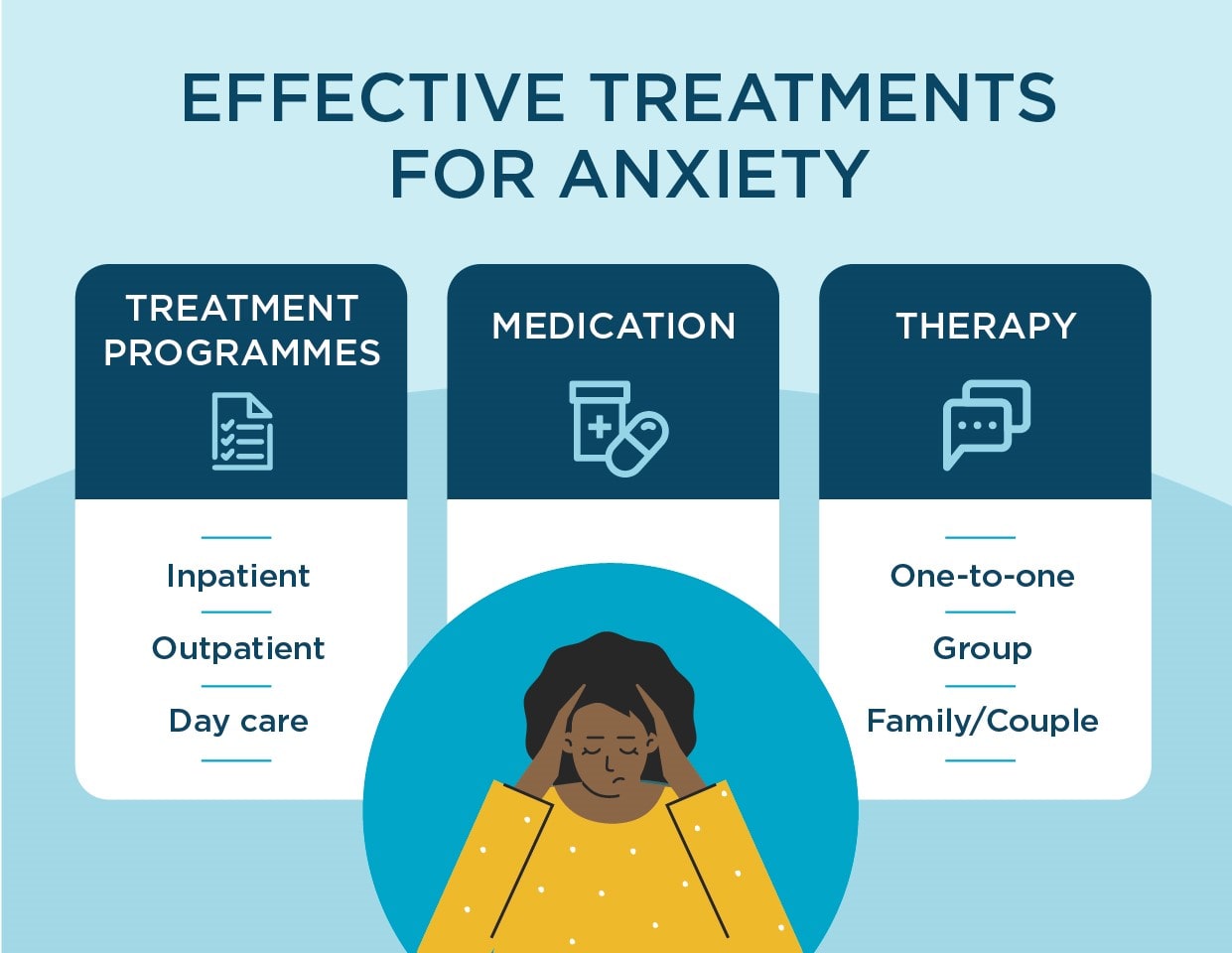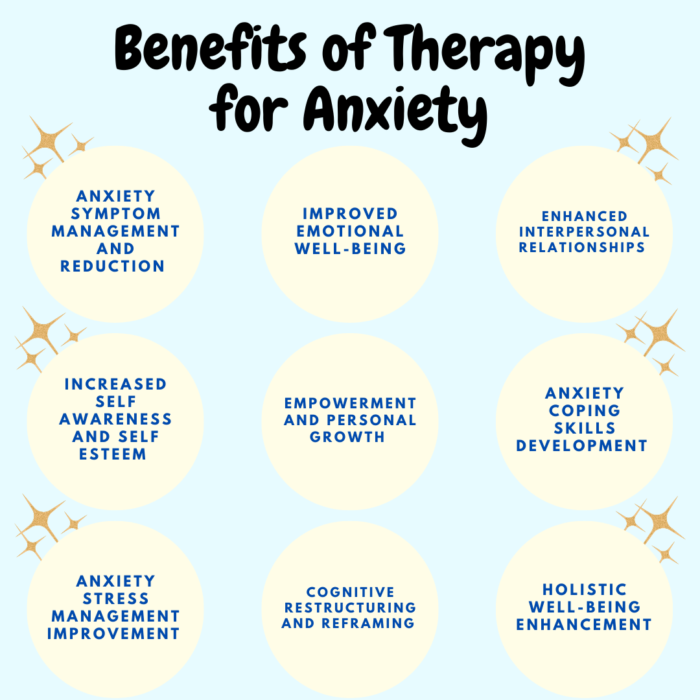Checking Out Different Strategies in Therapy for Stress And Anxiety Problem for Long-term Change
When dealing with anxiousness disorders, it's vital to explore a selection of therapy methods. Each technique supplies distinct insights and tools to assist you handle your signs properly. You might locate that incorporating techniques can produce the most effective results. Nevertheless, comprehending the subtleties of these techniques is crucial to cultivating enduring modification. What if the right mix could release a brand-new level of psychological well-being for you?
Recognizing Anxiety Conditions: A Short Overview
Anxiety disorders, which impact millions of individuals worldwide, can considerably impact life. You may experience overwhelming feelings of fear or worry that appear uncontrollable. These feelings can bring about physical signs like a racing heart, sweating, or perhaps dizziness. Common sorts of anxiousness conditions consist of generalised stress and anxiety disorder, panic attack, and social anxiousness problem. Each has one-of-a-kind indications, yet they all share a tendency to interrupt your routine and relationships.Understanding the source of your stress and anxiety is essential. It might stem from genes, brain chemistry, or life experiences. Acknowledging your triggers can assist you manage your feedbacks better. It is very important to remember that you're not the only one in this battle. Lots of people deal with comparable obstacles, and looking for aid is a strong step toward feeling much better. By learning more about anxiousness problems, you're already on the path to understanding and managing your condition better.
Cognitive-Behavioral Treatment: Testing Unfavorable Thought Patterns

Determining Adverse Idea Triggers
When you come across moments of distress, identifying the particular triggers behind your adverse thoughts can be crucial in managing stress and anxiety. Beginning by taking notice of circumstances that prompt sensations of fear or anxiety. Is it a jampacked room, a future deadline, or a conversation with specific individuals? Write down these circumstances in a journal. This will aid you identify patterns in your thinking. Notice physical feelings that accompany your unfavorable thoughts, like a racing heart or rigidity in your breast. By identifying these triggers, you get insight into what's fueling your anxiety. Understanding these connections is the primary step in challenging those thoughts and ultimately regaining control over your psychological feedbacks.

Replacing Thoughts With Positives
Testing adverse thought patterns is a necessary action in changing your way of thinking and minimizing anxiety. You may often find on your own caught in cycles of self-doubt or catastrophic thinking. Rather than allowing these ideas determine your feelings, practice changing them with positive affirmations or realistic choices. For example, when you believe, "I can not manage this," move it to, "I can manage difficulties one step at a time (Counseling services for anxiety)." This easy adjustment can considerably influence your mood. On a regular basis determining and responding to these unfavorable thoughts aids develop a healthier interior discussion. Keep in mind, it takes some time and initiative, yet constantly practicing this technique can lead to lasting modification, empowering you to face anxiousness with renewed self-confidence and strength
Structure Coping Techniques Together
Replacing unfavorable ideas is only the start of handling anxiousness efficiently. To develop lasting modification, you require to build coping strategies that encourage you. Cognitive-Behavioral Treatment (CBT) assists you recognize and test those unhelpful thought patterns. With each other, you and your therapist can check out exactly how these ideas impact your feelings and behaviors.Start by creating practical methods, like journaling or mindfulness workouts, that allow you to face anxiousness head-on. When you face your worries slowly, you'll find out to respond differently.

Mindfulness and Acceptance-Based Approaches: Cultivating Present-Moment Recognition
As you navigate the intricacies of anxiety, incorporating mindfulness and acceptance-based methods can considerably boost your ability to grow present-moment awareness. By concentrating on the present moment, you'll discover that you can observe your thoughts and sensations without judgment. This technique assists you acknowledge your anxiousness without really feeling bewildered by it.Engaging in mindfulness exercises, such as deep breathing, body scans, or guided meditations, allows you to ground yourself in your existing experience. Acceptance-based strategies urge you to embrace your emotions as opposed to battle against them. When you accept your sensations, they lose their power over you.Incorporating these practices right into your daily routine can transform how you react to stress and anxiety. You'll establish strength and find out to browse demanding scenarios with better simplicity. Ultimately, cultivating present-moment recognition lays the structure for long lasting modification, encouraging you to lead an extra fulfilling life.
Exposure Therapy: Challenging Worries Progressively
Direct exposure treatment assists you challenge your anxieties in a gradual means, making it less frustrating. You'll discover techniques to encounter anxiety-provoking situations action by step, while additionally building coping techniques to handle your reactions. This approach empowers you to take control and decrease anxiety in time.
Gradual Exposure Strategies
When dealing with anxiety, progressively facing your concerns can be an effective method to reclaim control. This method, referred to as gradual direct exposure, includes slowly subjecting yourself to the circumstances or items that trigger your anxiousness. Begin with much less daunting situations and progressively work your way up to even more tough ones. If you're scared of public speaking, you could start by talking in front of a mirror, after that progress to sharing thoughts with a pal, and ultimately resolve a tiny team. Each step helps desensitize you to the fear, building your self-confidence over time. Bear in mind, it's vital to speed on your own and commemorate small victories as you move through this procedure, strengthening your capacity to manage anxiousness successfully.
Building Coping Approaches
Structure effective coping techniques is necessary for taking care of stress and anxiety, particularly as you face your concerns progressively. One powerful method is direct exposure treatment, where you begin by facing your concerns in a controlled manner. Begin with less daunting situations and slowly work your means as much as even more challenging situations. This gradual direct exposure aids desensitize you to anxiousness sets off, making them less overwhelming.Incorporate relaxation methods, such as deep breathing or mindfulness, to soothe your mind throughout direct exposure. Track your progression, commemorating little triumphes along the road to increase your self-confidence. Bear in mind, it's okay to take your time; the objective isn't perfection but steady renovation. By building these methods, you'll encourage yourself to navigate stress and anxiety and welcome life extra fully.
Psychodynamic Treatment: Discovering Root Causes of Anxiety
Psychodynamic treatment explores the unconscious mind, exposing the source of your anxiousness - Counseling services for anxiety. By examining your thoughts, feelings, and previous experiences, this strategy assists you reveal underlying problems and unresolved problems that might add to your present stress and anxiety. You'll work with a therapist to investigate childhood experiences, relationships, and psychological patterns that shape your reactions today.As you acquire insight into these deeper layers of your subconscious, you'll start to acknowledge how previous occasions affect your existing behavior. This understanding can cause catharsis, allowing you to refine feelings you might have suppressed.Through the therapeutic relationship, you can also identify defense reaction that might have established with time, using a clearer path to alter. Inevitably, psychodynamic treatment outfits you with the devices to resolve your stress and anxiety at its core, advertising long-term change in your emotional wellness
Integrative and Alternative Methods: Combining Techniques for Greater Effectiveness
Integrating numerous healing techniques can improve your trip towards handling anxiousness better. By incorporating elements from cognitive-behavioral treatment, mindfulness methods, and alternative techniques, you can create a personalized technique that addresses your unique demands. You may make use of cognitive-behavioral techniques to challenge negative idea patterns while incorporating mindfulness workouts to ground yourself in the present moment.Additionally, checking out alternative practices such as yoga exercise or meditation can advertise relaxation and lower anxiety symptoms. This blend allows you to establish higher self-awareness and resilience.Experimenting with these varied methods can help you uncover what resonates most with you. Keep in mind, it has to do with finding a harmony that functions, instead of sticking to a single technique. This integrative technique not just provides prompt relief but also fosters long-term skills for managing stress and anxiety, empowering you to redeem control over your life.
The Role of Support Solutions: Structure Strength Via Connection
While it may seem that taking care of stress and anxiety is a singular journey, having a strong assistance system can play a necessary function in your strength. Surrounding on your own with compassionate buddies, family members, or support system produces a secure space where you can freely share your sensations and experiences. You remind yourself that you're not alone in this struggle.These relationships offer support and can give practical coping approaches that have functioned for others when you link with others. It's likewise a possibility to get viewpoint; friends can help you see circumstances in different ways, minimizing sensations of isolation.Moreover, psychological support promotes a feeling of belonging, which can considerably relieve stress and anxiety signs and symptoms. By leaning on your support group, you can construct strength and take on obstacles a lot more successfully. Keep in mind, connecting for aid is a sign of stamina, and it can make all the distinction in your trip towards taking care of anxiety.
Frequently Asked Inquiries
What Are the Usual Signs And Symptoms of Stress And Anxiety Conditions?
You could experience uneasyness, tiredness, problem focusing, irritation, muscle stress, and sleep disturbances. Physical symptoms can consist of fast heartbeat, sweating, and shivering. Recognizing these signs early can aid you look for suitable assistance and therapy.

How Much Time Does Treatment Commonly Last for Anxiety Problems?
Therapy for anxiousness conditions typically lasts anywhere from a couple of weeks to numerous months. It truly depends on your private demands, development, and the techniques your specialist uses to assist you handle your stress and anxiety effectively.
Can Drug Be Made Use Of Along With Therapy for Anxiousness?
Yes, drug can definitely be utilized alongside therapy for stress and anxiety. Incorporating both methods frequently enhances therapy effectiveness, assisting you handle signs and symptoms while exploring underlying issues with therapy. Constantly consult your medical care company for personalized guidance.
Are There Self-Help Techniques for Handling Anxiety?
Yes, there are a number of self-help approaches for taking care of anxiousness. You can exercise mindfulness, participate in regular workout, maintain a balanced diet regimen, develop a regular, and make use of deep breathing methods to help in reducing anxiousness signs efficiently.
Exactly how Do I Know if I Required Specialist Aid for Anxiety?
You should consider looking for specialist aid for anxiousness if it interrupts every day life, triggers substantial distress, or if self-help methods aren't functioning. Trust your instincts; connecting can lead to much better coping skills and support. Common kinds of stress and anxiety conditions include generalized stress and anxiety condition, panic condition, and social anxiousness disorder. When you encounter moments of distress, identifying the particular triggers behind your unfavorable thoughts can be necessary in managing anxiety. Changing adverse thoughts is only the start of managing anxiety properly. By examining your ideas, sensations, and past experiences, this method aids you reveal underlying problems more info and unsolved problems that might contribute to your current anxiousness. It's also a chance to obtain perspective; pals can help you see scenarios in a different way, decreasing sensations of isolation (Counseling services for anxiety).Moreover, emotional support cultivates a feeling of belonging, which can considerably alleviate anxiousness signs